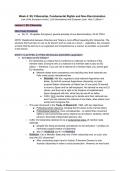Week 4: EU Citizenship, Fundamental Rights and Non-Discrimination
Law of the European Union | LLB International and European Law | Year 2 | Block 1
Lecture 1: EU Citizenship
Main Treaty Provisions:
● 20, 21, 18 (applies throughout; general principle of non-discrimination), 22-24 TFEU.
NOTE: Relationship between Directive and Treaty is more difficult regarding EU citizenship. The
structure that has been in use so far doesn’t work so well as a result — regardless, the concepts
at hand shall be laid out in as organised and comprehensive a manner as possible, as provided
in the lecture.
STEP 1: Is 20 TFEU, 21 TFEU OR Directive 2004/38/EC applicable?
● Is it about an EU Citizen?
○ EU citizenship is a status that is conferred on nationals or members of the
member state. Everyone who is a national of a member state is also an EU
citizen — therefore, if you are not a national of a member state, you cannot gain
EU citizenship.
■ Member states have competence over deciding who their nationals are.
Falls under public international law
● Micheletti: Mid 90s, regarded a dual-national Argentinian and
Italian. By birth M received Argentinian citizenship, but also
acquired Italian citizenship via Italian law. At one point, M wanted
to move to Spain and be self-employed. He claimed he was an EU
citizen, and thus had a right to the freedom of establishment.
Spain disagreed with this, while Italy did see M as Italian.
● CJEU: Only member states get to decide who their nationals are,
and if you are declared the national of one state, other states must
accept and recognise this.
○ This was introduced in the Treaty of Maastricht, 1983, with two objectives:
■ Political/symbolic objective: bringing the EU closer to the normal citizen
■ Political/legal objective: more consequential – to extend free movement
rights to non-economically active citizens (so all citizens: students, retired
persons, financially independent persons, etc)
○ CJEU: EU citizenship destined to be a fundamental status of member state
nationals.
■ Despite this being somewhat contradictory to the derivative + ancillary (ie.
necessary support) status of citizenship
■ See 31 Grzelczyk and 41-43 Rottmann.
○ Rottmann: Can a Member State strip one of their citizenship and, as such, also
strip their EU citizenship?
■ After conducting major fraud in Austria, R became German to lose
Austrian citizenship in order to avoid prosecution. However, he was found
, out, and had his German nationality withdrawn. R was left stateless. Is
this a case EU law applies to?
● CJEU: this decision is within the scope of EU law because R didn’t
only lose national citizenship, but also EU citizenship with it.
● The court found that a member state CAN deprive a person of
national and EU citizenship as long as proportionality is taken into
account. (para 55)
● Does the case fall within the scope of Directive 2004/38/EC?
○ 3(1): scope limited to EU citizens are are “moving to or residing in another
member state”
■ If one is hindered by their own member state or dissuaded by their own
member state to move away, this directive does not apply.
Structure within the Directive
● Articles 21 + 18 TFEU are concretised in Directive 2004/38, but this directive does not
exhaust all free movement rights.
● As an EU resident, one has the following rights:
Movement and residence rights Equal treatment rights
Directive provisions: 4, 5, 6, 7, 14(4)(b), 16 Directive provisions: 24
● Article 7 contains three categories of persons:
○ Workers + self employed
○ Persons with sufficient financial means
○ Students
● Also people who are no longer employed may retain worker status via 7(3) → important,
because once one is a worker they gain the right to equal treatment. Thanks to this
provision, even if you, e.g., get a (long-term) sickness, you retain that right. This ensures
that people who did work and lost their jobs remain ‘workers’ and keep those benefits /
rights.
● Derivative residence rights for family members: 7(1)(d), 7(2) and 7(4)
● 7(1)(b): Zhu and Chen
○ Context: China’s one child policy was still in place. This case regarded the
residence rights for EU citizens with a nationality of a third country.
○ The Chinese Mother used to travel to the EU for work a lot – and when she was
6-7 months pregnant with her second child, she went to Ireland and gave birth
there.
○ Given Irish law, if one is born on their territory, they acquire Irish citizenship, and
because of a different law in China the daughter did not acquire Chinese
citizenship.
○ They moved to Wales, meaning there was no border-crossing in this second
stage of events.





